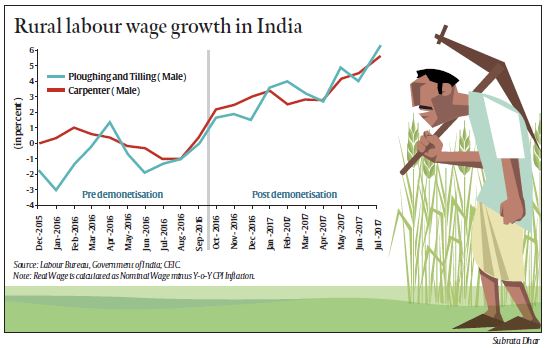Modi may be the last hope for the Indian economy to achieve greatness.
Recent weeks have witnessed an enormous amount of hand-wringing in the press about India’s economy. These articles share a common thematic trajectory: they start with a recitation of statistics that highlight a slowdown, lay it on the doorsteps of demonetisation and GST, and in the grand tradition of the blood-sport which is Indian politics, either use these statistics to settle personal scores, or, as in the case of the political opposition, use it to prepare oneself for 2019 with nervous glee. None of this hand-wringing is accompanied with any insight or solutions beyond the obvious.
The fox knows many things. The hedgehog knows one important thing.
In a now famous essay written when he was an Oxford Don in the 1930’s, Isaiah Berlin classified people into foxes and hedgehogs as a means of making a distinction about people and the different ways in which they confront reality. Foxes, according to Berlin, may know many things, but a coherent worldview is beyond their comprehension. The hedgehog, however, knows one great truth, and steadfast in its pursuit, remains unreconciled until he/she reaches it.
This parable is perhaps the best way to understand Narendra Modi and his actions surrounding the economy. Modi is the hedgehog who knows what India needs to do to become prosperous, but importantly, is also willing to act upon it. Indeed, he may be the only politician in contemporary Indian history who has undertaken structural reforms out of choice rather than, like Narasimha Rao in the 1990’s, being compelled to do so.
Structural reform is thankless: costs are borne upfront, and rewards come later. (The currency for this transaction is political capital, and Arun Jaitley has paid the most for his role as the able knight who is the face of such change.) For years, it was the very absence of these structural reforms that armchair foxes have bemoaned. Now that the reforms are occurring, the foxes are coming out of the forest, and unwilling to pay the price, claim that these are ill-timed, ill-conceived or ill-executed.
Through his decade-long executive leadership of one of India’s richest states, Modi knows what the foxes don’t: First, that there’s never a right time to make a hard choice, and second,
the slowdown is the result of a fundamental fragility of the Indian economy baked into India’s economic foundation at its creation: the government’s overwhelming role in the economy.
Modi is seeking to eliminate this fragility by recalibrating the entire engine of India’s economic growth methodically: Jaitley’s increasing of the states’ share in the divisible pool of union taxes in 2015, digitisation/demonetisation of the economy in 2016, the GST in 2017, Piyush Goyal’s work in the power sector over the last three years, Nitin Gadkari’s ongoing work in transportation, all are transformative and quantifiable contributors to the structure of the economy, and designed to create a robust and higher equilibrium for the Indian economy from which it can propel itself higher.
That these reforms are happening without any taint on any senior politician of the government is in itself a first in India’s modern history. The republic was lucky to survive through years of pillage under the Congress, and if it were nothing else but just that the BJP is taint-free, we would still have much to be thankful for.
But Modi’s toughest test is yet to come. Just as Modi fought the culture wars and reshaped our national discourse on identity and nationhood for all time, and just as how he is transforming India’s foreign policy through a new Modi-doctrine,
he must now dismantle the greatest vestige of Jawaharlal Nehru’s and Indira Gandhi’s legacy: the socialist superstructure that is the curse of India. Only when he is finished, will he have succeeded in his undeclared personal ambition:
to bury Nehru and Indira Gandhi forever.
To do so involves treating the economic organisation of a society not merely in transactional terms, but as a moral issue inextricably linked to individual rights and dignity, and moving wholeheartedly towards the only economic system that provides for such: a free-market system adapted to help those on India’s economic margins.
In doing so, he would do well to reduce his reliance on ever wiser economic councils and bureaucrats, but follow his hedgehog instincts which have yielded such sharp results in foreign policy and India’s culture wars. (As an aside, I note with some amusement a lesson from my first class in economics with Professor Jagdish Bhagwati: “India did so badly in the 50’s and 60’s not because it had too few economists, but because it had too many!”)
This then, is the call to arms. In addition to a dogged focus on anti-corruption (a necessary issue for 2014 but insufficiently ambitious for 2019), Modi needs to speak to the country in civilisational terms about the manner of its economic organisation, and seek the mandate to put the nation on the path to double-digit growth for decades to come.
In practical terms, and as a first step, it requires the sale of the government-owned banks and PSU’s in their entirety. Not re-capitalisation, not mere NPA-resolution, not partial-disinvestment of loss-making PSU’s etc. A complete sale. These are giant black holes that destroy capital, or at best, use it sub-optimally. Modi cannot rebuild a nation without removing the termites from its foundation.
By seizing the time still available in 2017-2019 (and perhaps for five years thereafter), Modi may still live up to his own revolutionary declaration of 2014: “Government has no role in business”. Modi may represent the last best hope for the Indian economy to achieve true greatness.
If Modi doesn’t do it now, India will be condemned to this middling, snakes-and-ladder growth pattern for another several generations.
If not Modi, then who? If not now, then when?
The hedgehog knows.
